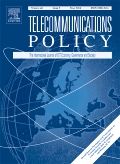Study on Risk Aversion in Information Technology
"While US companies, such as Apple and Google, dominate the consumer market, European companies in the information and communication technologies sector are largely irrelevant today." According to Arnd Weber from ITAS and his co-author Daniel Scuka, mobile communications expert, this loss of relevance was caused by repeated attempts of European providers to oligopolistically market communication capacities in closed environments instead of using the open internet as done by US companies. In the mid-1980s, for instance, manufacturers and network operators tried to push the closed system "Bildschirmtext" (videotex) and, in the late 1990s, sold expensive services such as SMS and MMS, when the mobile internet was already emerging.
"European investors did not only sleep through new developments. It is even worse. For more than 20 years, they have known attractive products, but did not take the risk of investing in their manufacture," Weber concludes. This does not only apply to smartphones. First PCs with graphical user interfaces were manufactured in Switzerland in 1980, four years before Apple’s Macintosh. But no one dared to invest in greater production.
More Competition, More Innovation
In their article, the authors suggest different ways to make better use of the market opportunities in the future. As in other branches, competitors are needed that surprise each other. "Granting Europe-wide licenses to mobile operators would create internationally competitive companies. Their market power over manufacturers of mobile devices could then be used to market new services, such as cost-free communication over large distances through improved WiFi," Scuka says.
Another market opportunity lies in eavesdropping-proof and complete communication between computers and smartphones. If there were legal regulations and standards for highly secure computers without any loopholes, similar to safety regulations for airplane construction or in medicine, this could be beneficial for the location. "Security made in Germany" might then be in demand worldwide, the authors say. (09.05.2016)
Bibliographic data:
Arnd Weber, Daniel Scuka
Operators at crossroads: market protection or innovation? "Telecommunications Policy", April 2016, doi:10.1016/j.telpol.2015.11.009
Read the article online here
KIT press release


